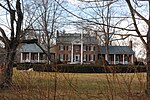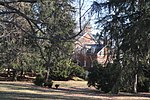Farmer's Delight
Federal architecture in VirginiaHouses completed in 1791Houses in Loudoun County, VirginiaHouses on the National Register of Historic Places in VirginiaNational Register of Historic Places in Loudoun County, Virginia ... and 1 more
Plantation houses in Virginia

Farmer's Delight was built in Loudoun County, Virginia in 1791 by Colonel Joseph Flavius Lane. The Federal style brick plantation house incorporates elements of Georgian architecture. The house is now closely associated with American oilman and diplomat George C. McGhee, who owned the property after 1948. The house is maintained by the McGhee Foundation and is listed on the National Register of Historic Places.
Excerpt from the Wikipedia article Farmer's Delight (License: CC BY-SA 3.0, Authors, Images).Farmer's Delight
Dinwiddie Farm Lane,
Geographical coordinates (GPS) Address Nearby Places Show on map
Geographical coordinates (GPS)
| Latitude | Longitude |
|---|---|
| N 39.019677777778 ° | E -77.756202777778 ° |
Address
Dinwiddie Farm Lane
Dinwiddie Farm Lane
20131
Virginia, United States
Open on Google Maps





